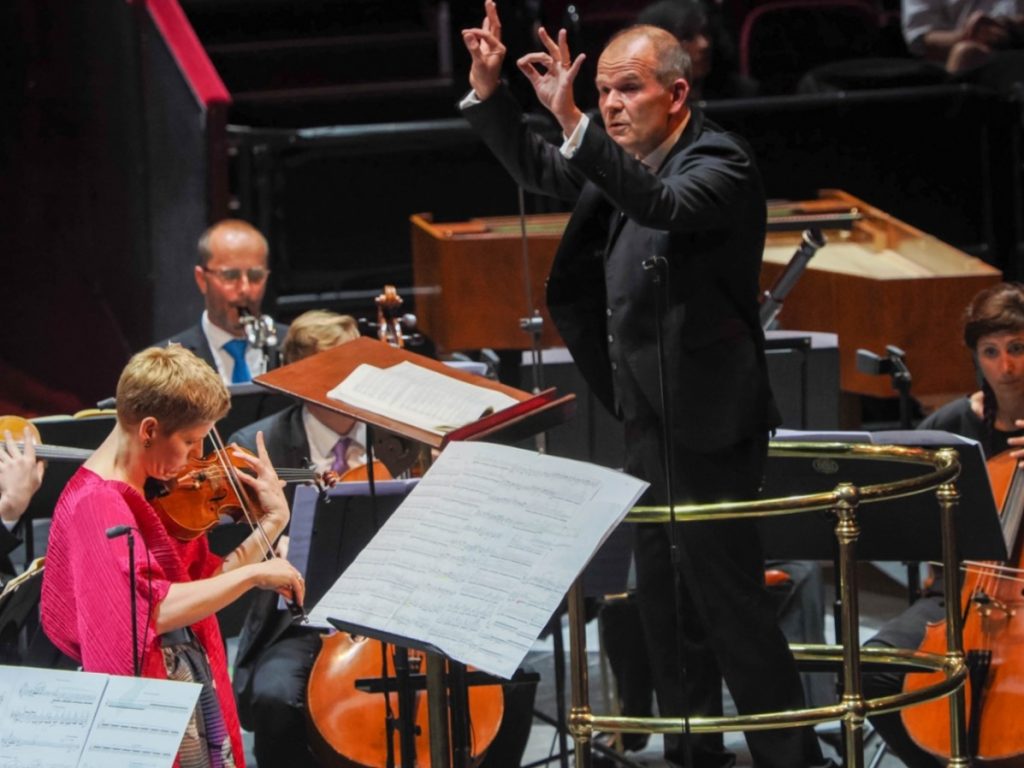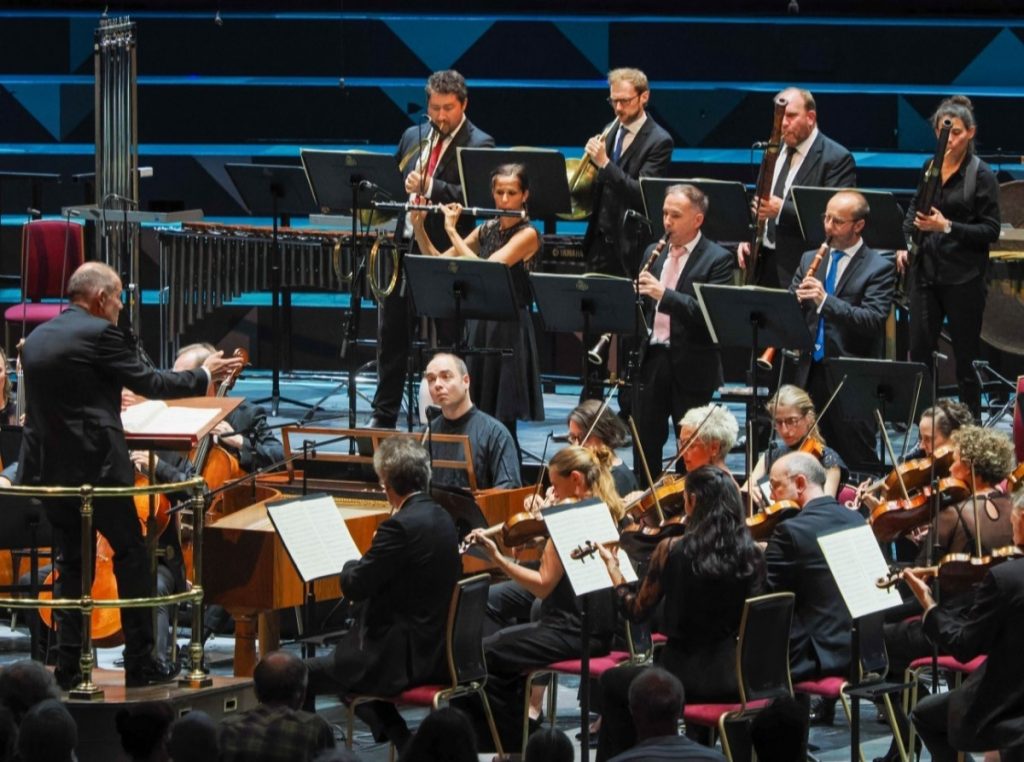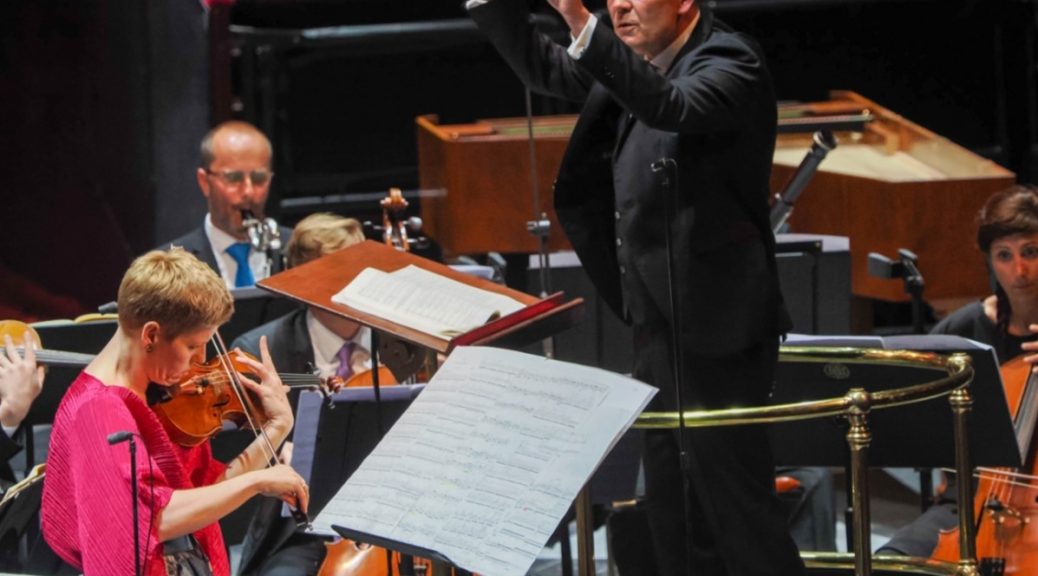
Photo credit: Sisi Burn
 (4 / 5)
(4 / 5)
There is much to be said about returning to how music used to be played. What is its purpose today? Should we look back at all? Will it keep getting audiences? In comes Les Siècles, best remembered for their Lully some ten years ago, now boasting a 20th birthday this year. The serious but playful maestro François-Xavier Roth keeps everyone in check, his little turn to acknowledge rampant coughers during a movement breaks was funny. He usually exudes confidence and gives lots to the players as well.
The genius of György Ligeti is front and centre for his centenary celebrations. The Proms have already honoured his usage in 2001: A Space Odyssey in concert, now parodied in this years billion dollar busting Barbie from Greta Gerwig. There could not be a better time to hear this most eccentric and outrageous of composers.
In its first ever Proms outing, his Concert Românesc from 1951, is a pristine find. Taking over from Bartók, this is the next level from Transylvania folk findings and new inventions along the way. It’s quite vanilla for most part in the first three movements, things seem to plod along nicely with flavourful songs and an all round infectous charm. Though the final movement, the peasants fiddle melody turns on its head as unusual tuning techniques have been applied here. The spooky last movement would have upset Soviet sensibilities and apparently had it banned for its rockstar quality. It still saw performances anyway, proving the pieces popularity.
Decades later, Ligeti wrote one of the more strange violin concertos imaginable. Isabelle Faust as our soloist really got into what feels like a highly difficult work. Broad new ways of playing meets overtones, ocarinas and swanee whistles in the woodwind and hushed cadenzas propel the Violin Concerto into a surreal realm of possibilities. Faust fiddles with a piercing, passionate flair, just trying to tackle this piece should be commended. The percussion was also note worthy with vibraphones, glockenspiel and little cymbals, some of the work being inspired by music from Papua New Guinea. Multiple listens would envelop the questions you find yourself asking. An encore of Kurtag’s Doloroso from Signs, games and messages was so painfully quiet, you could hardly take it in.

Photo credit: Sisi Burn
Now, we come to it. Sound levels. In keeping with said tradition of faithful music making, here is where the concert fell on its face. By using a forte piano for Mozart’s Piano Concerto No. 23, it was simply to quiet for his monumental hall. Fine playing from Alexander Melnikov, who seemed to relish this odd return to form. Yet it was as if his refined playing was not there at all, the crumbly, slight sound of the fortepiano giving him very little to work with. A man in front of me cricked his neck and cupped his ear to try and hear better (we were in the side stalls, not that far away). I’ve always seen the instrument as the stepping stone between the harpsichord and the piano we know today, it’s easy to see why it fell on the way side. The lack of dampener is also disheartening and just might be the major problem point. That aside, it was pleasant enough (its touching and has room to breath) and the orchestra revelled in this Mozart which proves to be popular at the Proms.
Luckily, the final piece, Mozart’s Jupiter Symphony (No. 41 in C major) kept tuning and instruments of its day and still worked! I kept finding lovely moments in this famous piece, all the players shone throughout, defining how the symphony was changing and evoling in his day. I could feel the energy, the green and floral nature of it a real testament to Mozart’s genius. Motifs grow and rouse towards the gripping finale. This is how it’s done. Popping a bell jar on the past, without setbacks. No encore, though I think this audience was quite happy.
Listen to all Proms concerts on BBC Sounds

